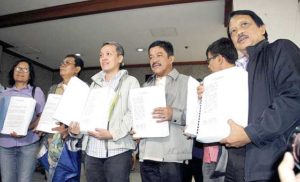Various groups charged former president Benigno Aquino 3rd and former Budget chief Florencio Abad for technical malversation on Friday, making good on their vow to bring the two to court over the implementation of the controversial Disbursement Acceleration Program (DAP).
In a 26-page complaint filed before the Ombudsman, groups led by the Volunteers Against Crime and Corruption, Bayan Muna and Gabriela argued that the DAP—supposedly an economic stimulus program that allowed agencies under the executive branch to declare their unspent appropriations as savings anytime and realign the funding with the previous administration’s pet projects including those of lawmakers—was a clear mismanagement of public funds.
The Supreme Court declared the DAP illegal in July 2014 and affirmed its ruling in February 2015 on the grounds that the Constitution does not allow agencies to declare savings at any time and transfer the money to another branch of government.
Former deputy presidential spokesperson Abigail Valte said the complaint was not surprising.
“It is clearly part of their continuing harassment of a president who refused to be cowed by their chest-beating during his entire term,” she said.
The high tribunal left open the possibility of the “authors” of DAP being held liable for malversation of funds.
“The DAP was nothing more than presidential pork taken from forced savings then realigned for pet projects of the President. It was presidential pork used to entice lawmakers to impeach then convict former chief justice Renato Corona,” Bayan Muna party-list Rep. Carlos Zarate said.
Corona, who succumbed to cardiac arrest in April, was convicted by the Senate impeachment court of betrayal of public trust and culpable violation of the Constitution for supposedly hiding his wealth in his statements of assets and liabilities from 2002 to 2012.
To bolster their claims, the complainants cited a memorandum sent by Abad on October 12, 2011 to then President Aquino stating: “Mr. President, this is to formally confirm your approval of the Disbursement Acceleration Program totaling P72.11 billion. We are already working with all the agencies concerned for the immediate execution of the projects therein.”
This memorandum was followed by another memorandum for the President dated December 12, 2011 requesting omnibus authority to consolidate savings and unutilized balances for fiscal year 2011.
Identical requests for authority to pool savings and to fund projects were also contained in various other memoranda from Abad dated June 25, 2012, September 4, 2012, December 19, 2012, May 20, 2013 and September 25, 2013.
Then President Aquino approved all the requests, withholding approval only on proposed projects contained in the June 25, 2012 memorandum, as shown by his marginal note that indicated that the proposed projects should still be “subject to further discussions.”
The Supreme Court ruling against the DAP pointed out that unreleased appropriations and withdrawn and unobligated allotments under the DAP were not savings, and the use of such appropriations contravened Section 25(5), Article VI of the 1987 Constitution.
Aside from technical malversation, Aquino and Abad were also accused of usurpation of legislative powers as well as graft and corruption.
But for Citizens’ Battle Against Corruption party-list Rep. Sherwin Tugna, the charges against Aquino and Abad would not prosper because the same Supreme Court ruling that found DAP illegal also stated that the President acted with good intentions.
“The virtue of the statement made by the Supreme Court in the DAP case where the SC [Supreme Court] said the executive department acted in good faith... that is a strong defense that the former President can anchor on,” Tugna, a lawyer, said.
The complainants, however, countered that good faith was not an excuse.
“We do not doubt the existence of the presumptions of ‘good faith’ or ‘regular performance of official duty,’ yet these presumptions are disputable and may be contradicted and overcome by other [pieces of] evidence,” they said.
“Many civil actions are oriented toward overcoming any number of these presumptions, and a cause of action can certainly be geared toward such effect. The very purpose of trial is to allow a party to present evidence to overcome the disputable presumptions involved,” the complainants added.


